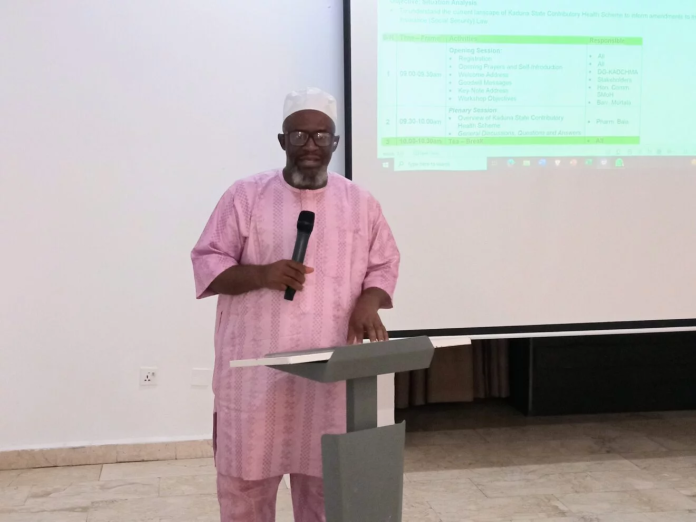The Kaduna State Government has begun the review of its Health Insurance Scheme under the State Social Security Law, 2023, to align with the National Health Insurance Authority Act (NHIA), 2022.
Malam Abubakar Hassan, Director-General, State Contributory Health Management Authority (KADCHMA), said at the four-day review meeting, in Abuja on Monday, that the move was to reposition the scheme to deliver its mandate.
The News Agency of Nigeria (NAN) reports that the review was supported by Lafiya, a United Kingdom support for health in Nigeria programme and Partnership to Engage, Reform and Learn (PERL).
PERL is a governance programme of the UK’s Foreign Commonwealth and Development Office (FCDO).
Hassan pointed out that a lot has changed since the enactment of the state Contributory Health Management Authority Law, 2018, which was harmonised with the state Pension Law as the Kaduna State Social Security Law, 2023.
According to him, the advent of NHIA, 2022 and the state social security law, made the review of the law crucial with a view to ensure conformity with extant laws at the federal level.
He said, “This will enable us to adequately respond to emerging trends in the health insurance and social security space and reposition us to deliver our mandates.”
Mr Bala Saidu, Head of Planning, Monitoring and Evaluation, KADCHMA, while providing an overview of the contributory health scheme, said that the Authority aligns with the Universal Health Coverage (UHC).
Saidu explained that the mission of the Authority is to provide access to sustainable, quality, and affordable health care services without financial risk to the residents of the state.
According to him, the core mandate of KADCHMA is to ensure access to quality, affordable, and equitable healthcare services to all residents of the state without financial barriers in efforts to achieve UHC.
He, however, said that delivery of the mandate was plagued with a myriad of challenges such as the non-compliance by the organized private sector.
This, according to him, is due to the lack of enforcement of the mandatory aspect of the scheme.
Saidu said, “There is also the lack of the government’s 3 per cent counterpart contribution for formal sector enrollees, which affects the provision of service to the principal, spouse, and four dependents.
“Also, the lack of releases of the 1 per cent consolidated revenue fund equity funds is threatening access to healthcare services by the vulnerable population enrolled in the scheme.
“Another challenge is the non-payment of 25 per cent counterpart contribution to enable the state to access the Basic Health Care Provision Fund.
“There is also the inclusion of non-biological dependents and spouses by some principal enrollees which is threatening the pool.
“Other challenges are inadequate office space, and shortage of manpower.”
Mr Murtala Salisu, Director, Legal Drafting, Ministry of Justice, said that review was to understand the current landscape of the contributory health scheme to inform the amendment of the law.
Salisu added that the review also provided an opportunity to analyse the discrepancies and misalignment existing between the Kaduna state social security law and the NHIA.
According to him, the findings on the gaps and misalignment in the existing law will determine the amendments to the state law.
He said, “This is because any law that is not in tandem with NHIA will constitute a problem.”
Tanimu pointed out that the NHIA has made health insurance compulsory for all Nigerians, adding that, “reviewing the state law will enable the state contributory health scheme to deliver on this.”
A representative of civil society at the meeting, Mr Mustapha Jumare, also lauded the state’s commitment to reposition the scheme to deliver quality and affordable healthcare services to its population.
Jumare added that the participation of civil society organisations in the review of the law demonstrates the government’s resolve to strengthen citizens’ participation and ownership of government policies and laws.
Earlier, Mr Ashiru Sani, a public sector reform expert with PERL, said that the review of the law would also lead to a review of the scheme’s operational plan among other strategic documents.
Sani assured the state of PERL’s continued support to ensure that a larger portion of the population, particularly the poor and vulnerable, access quality basic health care services.
Similarly, Mr Muazu Habibu, State Team Lead, Lafiya programme, said that the programme would continue to provide technical and financial support to enable Kaduna state to provide quality healthcare services to its population. (NAN)
By Philip Yatai




